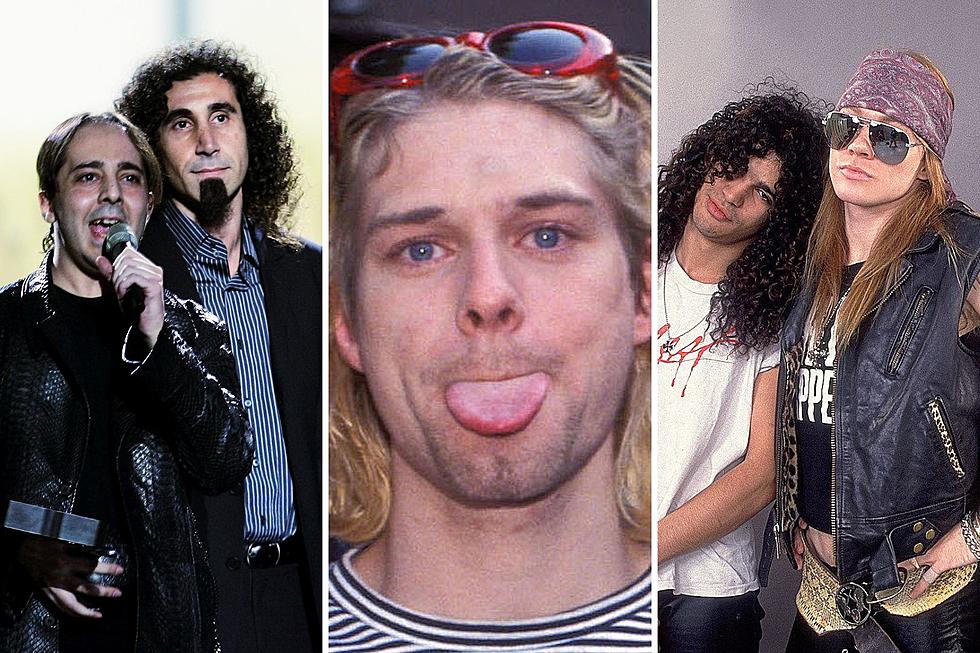
‘Full Metal Jackie’ Host Goes Through Metal’s Most Influential Lyrics in Book
 Jackie Kajzer, the host and developer of the nationally syndicated metal radio show 'Full Metal Jackie,' is a lyrics person. She likes to dive deep into songs and learn the meanings behind them. And she's apparently not the only one. When she pitched the idea behind her forthcoming book, 'Full Metal Jackie Certified: The 50 Most Influential Heavy Metal Songs of the '80s and the True Stories Behind Their Lyrics,' she was surprised the publisher accepted it.
Jackie Kajzer, the host and developer of the nationally syndicated metal radio show 'Full Metal Jackie,' is a lyrics person. She likes to dive deep into songs and learn the meanings behind them. And she's apparently not the only one. When she pitched the idea behind her forthcoming book, 'Full Metal Jackie Certified: The 50 Most Influential Heavy Metal Songs of the '80s and the True Stories Behind Their Lyrics,' she was surprised the publisher accepted it.
"I was approached about doing something before, but I put together this pitch and they were totally into it," Kajzer told Noisecreep. "I thought, 'Oh my gosh. I have to write a book.' It was really exciting. I'm very into lyrics. So I thought this was kind of a cool concept. There's been a lot of great metal books out there -- I know because I have them all -- on metal bands and lists and specific artists, but nothing on actual lyrics and taking apart the lyrics to metal songs."
Available for pre-order and in stores early January via Course Technology PTR, the book features interviews with iconic rock artists, offering insight into the inspiration behind such hits as Judas Priest's 'Breaking the Law,' AC/DC's 'Back in Black,' Motörhead's 'Ace Of Spades,' Megadeth's 'Peace Sells,' Pantera's 'Cemetery Gates' and even Jane's Addiction's 'Jane Says.' Written by Kajzer with Roger Lotring, the book also features classic photos by renowned rock photographer Mark Weiss and a foreword written by Dave Mustaine of Megadeth.
"My idea for this book came from my radio show," Kajzer said. "A lot of the songs I play on my show are the classic rock songs that were never meant for radio -- not meaning they weren't good enough. It's just that if a song's meant for radio, labels will spend the time and effort to make edits of them and pull the curses off them. Many of these songs never had that.
"I was like, 'Wow. How great would that be if I was able to play whatever song on commercial radio.' So I would pull the songs, pull the lyrics and go through them. Sometimes we think we know the lyrics. We make our own when we don't know them. When you really pull the lyrics and you read them, it makes it even more powerful."
 In developing the book, she thought that focusing on the '80s made sense. After all, that's when metal was born. "I feel like it was a good start," she said. "I think this whole metal scene was born in the '80s, and metal was born in Los Angeles. A lot of what I grew up on came from the '80s. I think it was very important to what came later--in terms of influence wise.
In developing the book, she thought that focusing on the '80s made sense. After all, that's when metal was born. "I feel like it was a good start," she said. "I think this whole metal scene was born in the '80s, and metal was born in Los Angeles. A lot of what I grew up on came from the '80s. I think it was very important to what came later--in terms of influence wise.
"I would listen to a lot of these songs over and over and over. When you read the lyrics, it makes you look at a song in a totally different way. The way that these songs are listed in the book, it's chronological order by U.S. release date. I wanted the result to be this timeline that tells a story about how this genre developed over the course of a decade."
Once she chose the decade, narrowing the list down to 50 was a tough job. "That was really, really hard," Kajzer said. "Initially, it was quite larger than that. To narrow it down and cut songs off the list was very hard. When I would start to talk to people about why I was doing this, they would say, 'Why not this band? Why not that band? Why not this song?' I wanted this to cause conversation. I wanted this to cause people to think. Even if it was thinking about whether or not they agree or disagree. As metal fans, we do that. We're like, 'You're wrong. This is what it should be.'
"But it was just a matter of pulling the lyrics to all of these songs and deciding and thinking about whether or not myself and my co-writer felt that these were influential lyric wise to what came later." Writing 'Full Metal Jackie Certified,' she said was a fun yet trying project. It was a thrill to be able to chat with these artists that she had grown to know during the course of her radio show.
"I would ask them, 'Do you remember where you were when the idea came to you to write this song?'" Kajzer said. "[Ronnie James] Dio told me what street corner he was on when he wrote one of the songs that's in the book. It's cool to get these guys to go back in time, because it's a long time ago now to think about that time and what was happening during that time. I think there's been a lot of misconceptions about certain songs. To hear the true stories about all of these songs and the lyrics was really cool."
More From Noisecreep









